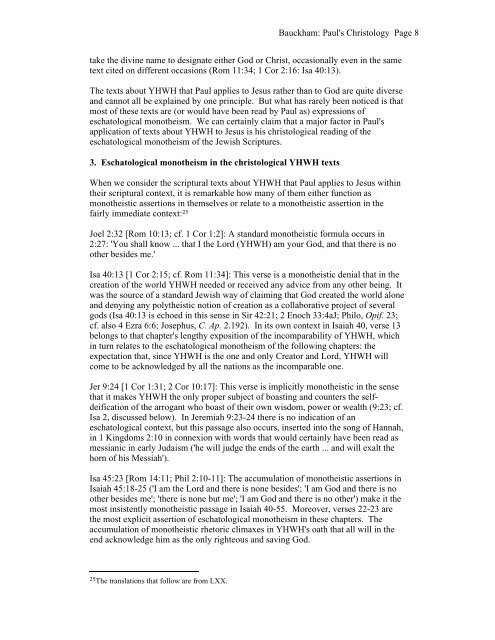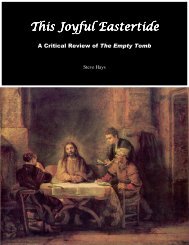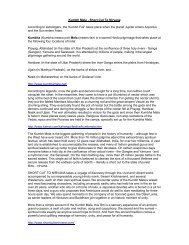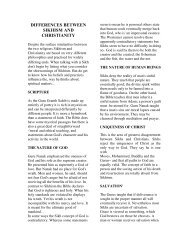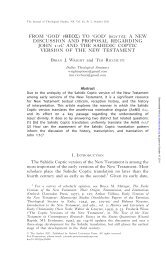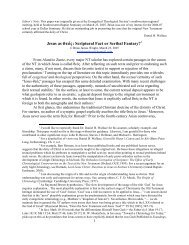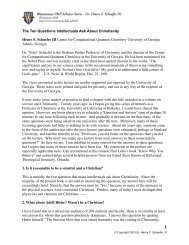Paul's Christology of Divine Identity © Richard ... - For an Answer
Paul's Christology of Divine Identity © Richard ... - For an Answer
Paul's Christology of Divine Identity © Richard ... - For an Answer
You also want an ePaper? Increase the reach of your titles
YUMPU automatically turns print PDFs into web optimized ePapers that Google loves.
Bauckham: <strong>Paul's</strong> <strong>Christology</strong> Page 8<br />
take the divine name to designate either God or Christ, occasionally even in the same<br />
text cited on different occasions (Rom 11:34; 1 Cor 2:16: Isa 40:13).<br />
The texts about YHWH that Paul applies to Jesus rather th<strong>an</strong> to God are quite diverse<br />
<strong>an</strong>d c<strong>an</strong>not all be explained by one principle. But what has rarely been noticed is that<br />
most <strong>of</strong> these texts are (or would have been read by Paul as) expressions <strong>of</strong><br />
eschatological monotheism. We c<strong>an</strong> certainly claim that a major factor in <strong>Paul's</strong><br />
application <strong>of</strong> texts about YHWH to Jesus is his christological reading <strong>of</strong> the<br />
eschatological monotheism <strong>of</strong> the Jewish Scriptures.<br />
3. Eschatological monotheism in the christological YHWH texts<br />
When we consider the scriptural texts about YHWH that Paul applies to Jesus within<br />
their scriptural context, it is remarkable how m<strong>an</strong>y <strong>of</strong> them either function as<br />
monotheistic assertions in themselves or relate to a monotheistic assertion in the<br />
fairly immediate context: 25<br />
Joel 2:32 [Rom 10:13; cf. 1 Cor 1:2]: A st<strong>an</strong>dard monotheistic formula occurs in<br />
2:27: 'You shall know ... that I the Lord (YHWH) am your God, <strong>an</strong>d that there is no<br />
other besides me.'<br />
Isa 40:13 [1 Cor 2:15; cf. Rom 11:34]: This verse is a monotheistic denial that in the<br />
creation <strong>of</strong> the world YHWH needed or received <strong>an</strong>y advice from <strong>an</strong>y other being. It<br />
was the source <strong>of</strong> a st<strong>an</strong>dard Jewish way <strong>of</strong> claiming that God created the world alone<br />
<strong>an</strong>d denying <strong>an</strong>y polytheistic notion <strong>of</strong> creation as a collaborative project <strong>of</strong> several<br />
gods (Isa 40:13 is echoed in this sense in Sir 42:21; 2 Enoch 33:4aJ; Philo, Opif. 23;<br />
cf. also 4 Ezra 6:6; Josephus, C. Ap. 2.192). In its own context in Isaiah 40, verse 13<br />
belongs to that chapter's lengthy exposition <strong>of</strong> the incomparability <strong>of</strong> YHWH, which<br />
in turn relates to the eschatological monotheism <strong>of</strong> the following chapters: the<br />
expectation that, since YHWH is the one <strong>an</strong>d only Creator <strong>an</strong>d Lord, YHWH will<br />
come to be acknowledged by all the nations as the incomparable one.<br />
Jer 9:24 [1 Cor 1:31; 2 Cor 10:17]: This verse is implicitly monotheistic in the sense<br />
that it makes YHWH the only proper subject <strong>of</strong> boasting <strong>an</strong>d counters the selfdeification<br />
<strong>of</strong> the arrog<strong>an</strong>t who boast <strong>of</strong> their own wisdom, power or wealth (9:23; cf.<br />
Isa 2, discussed below). In Jeremiah 9:23-24 there is no indication <strong>of</strong> <strong>an</strong><br />
eschatological context, but this passage also occurs, inserted into the song <strong>of</strong> H<strong>an</strong>nah,<br />
in 1 Kingdoms 2:10 in connexion with words that would certainly have been read as<br />
messi<strong>an</strong>ic in early Judaism ('he will judge the ends <strong>of</strong> the earth ... <strong>an</strong>d will exalt the<br />
horn <strong>of</strong> his Messiah').<br />
Isa 45:23 [Rom 14:11; Phil 2:10-11]: The accumulation <strong>of</strong> monotheistic assertions in<br />
Isaiah 45:18-25 ('I am the Lord <strong>an</strong>d there is none besides'; 'I am God <strong>an</strong>d there is no<br />
other besides me'; 'there is none but me'; 'I am God <strong>an</strong>d there is no other') make it the<br />
most insistently monotheistic passage in Isaiah 40-55. Moreover, verses 22-23 are<br />
the most explicit assertion <strong>of</strong> eschatological monotheism in these chapters. The<br />
accumulation <strong>of</strong> monotheistic rhetoric climaxes in YHWH's oath that all will in the<br />
end acknowledge him as the only righteous <strong>an</strong>d saving God.<br />
25 The tr<strong>an</strong>slations that follow are from LXX.


